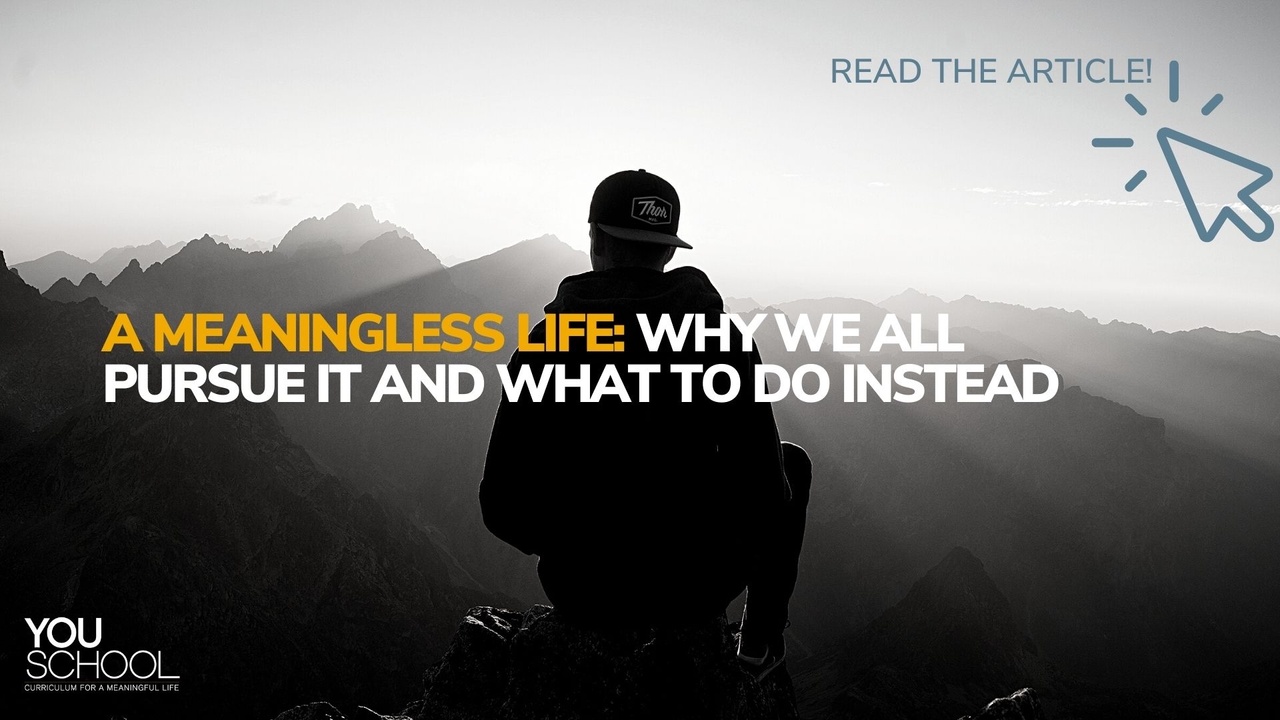Guiding Your Kids to Pursue Meaning

Do you ever get 'The Sunday Blues'? It's that icky feeling we all get sometimes when we're feeling bored, unsettled, and stuck. Growing up, my sister and I called it 'that homesick feeling' we would get sometimes like we knew we weren't in a place that we belonged. Everyone gets the feeling. You get it, I get it, and our kids get it.
Students will fill the void they feel, but will they fill it well?
Viktor Frankl was an Austrian Neurologist and Psychiatrist (Medical Doctor and Psychiatrist) who was sent to Auschwitz and three other concentration camps during World War II because he was Jewish. He experienced terrible loss with the death of his parents and his wife. But he survived and came out of the camps and out of the war to write A Man's Search For Meaning, a global bestseller describing his experiences of the camps and his observations for why some people clung to hope and survived, while others died.
Frankl developed a framework to support people through suffering and to help explain how all of life works. He says we all have a “will to meaning” in our lives- an innate drive to find a purpose and a reason for being. One of the key ways he proposed to help us understand how to build a meaningful life is to engage with our own 'existential vacuum'.
An existential vacuum is the feeling we all get of hopelessness, meaninglessness, a stuck-in-the-moment with no foresight for relief. It's a disconnection from creativity, from bonding to others, from opportunities to use your talents for the sake of someone else.
Maybe you feel the existential vacuum on a Sunday afternoon when you think about going to work the next day. Maybe it’s on your commute home after spending all day in meetings that felt inefficient and repetitive. Or perhaps it’s in those rare moments of reflection when you hear about someone’s death, and you wonder what kind of legacy you’ll leave.
The existential vacuum is a feeling.
We all get it.
It's common to the human experience.
What does it feel like to you? Some say boredom. Others say loneliness. Or anxiety. Thoughts creep in: you don't have what it takes // you're all alone // no one cares about you // nothing you do matters // this is too hard // this isn't the way it's supposed to be...
Where do you go when you feel it- what does it drive you to do? Entertainment? Social media? Work? Cleaning? Shaming yourself. Criticizing others? A review of your bank account or how many followers you have? Envy of others?
The temptation will always be to fill that void you feel with something that falls short from what you truly long for. You’ll be drawn to pursue:
- Career Success.
- Respect from others.
- Products from Magnolia.
- Security.
- People thinking well and highly of you.
- Being busy.
- A higher degree.
- Cryptocurrency.
- Abs.
- Subway tile in your bathroom.
- The latest yoga pants.
- Running a sprint triathlon.
- A Tesla.
- A trip to Tulum.
- A scratch handicap.
None of those accomplishments, products, experiences or possessions will fill your life with meaning. They’re distractions. And yet, most of what we pursue, search for on the internet, scroll through on Instagram, and invest in focus on those things. We model those pursuits to the next generation, too.
Adults feel the existential vacuum, and so do teenagers. Really, that’s when the deeper questioning starts for most.
Teens today are particularly prone to wondering what the point of life is all about.
They’ve been exposed to extraordinary events like financial crashes, political upheaval, a global pandemic, worsening racial tension, natural disasters, and rampant selfishness and immaturity from leaders. Sure, previous generations saw horrible global scenarios, too. But there’s an edge out there that borders on collective nihilism. At least that’s where the culture seems to be headed.
Unless we can figure out a way to guide the next generation into deeper reflection and a wise framework for them to build their lives on faith, hope, and love.
As bold and audacious as it sounds, that’s what we’re trying to do through the YouSchool- give young people and the adults who care about them a roadmap for building a life that’s deeply meaningful and practically relevant to bring good to the world.
In the meantime, we invite you to pay attention to your own existential vacuum. Here's what you can do to use that icky, empty feeling for your good:
- Understand it as an indicator. A prompt. A trigger. That feeling is trying to tell you something. It’s trying to get your attention.
- Embrace it. Explore it. Befriend it. Be curious about it. Have a conversation with it.
- Make observations about it. Depersonalize the feeling as just something that comes and goes, like hunger or thirst.
- Talk with other people about it. Share the feeling you get with your friends. Talk about it with your kids.
The existential vacuum is an invitation, really. It’s an invitation to take inventory of your life and the arc of your story. It’s a reminder that there’s something more, something deeper- and only that will truly satisfy your soul. Feeling lonely, empty, bored, or lost are the symptoms of a problem and an indication that there’s a more right, centered, and whole way to live.
- Scott Schimmel
If you're interested, during the early days of the shutdown, we went live every school day with a short 'workshop' for students who were stuck at home. Here's a 10 minute video talking more about the existential vacuum.
